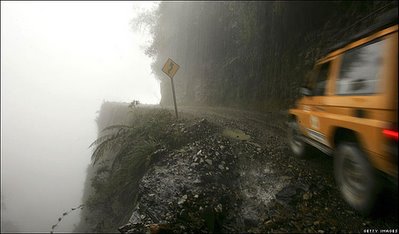
Arms Control Wonk demolishes the DSB Task Force report on nuclear capabilities, and erects a veritable palace of snark in its place:
Concerned citizens should be aware, the authors warn, of “an entrenched set of views held by an influential segment of the U.S. population” ... crazy views like …At WhirledView, Cheryl Rofer dissects the “existential threat” of nuclear terrorism:
- smaller, less alert forces would be good;
- US emphasis on nuclear weapons might encourage proliferation;
- nonproliferation is more important than deterrence after the end of the Cold War;
- nuclear weapons should only be used to deter other nuclear threats; and
- that new nuclear weapons might just generally be a bad idea.
Al-Qaeda and similar organizations have the motivation, but they have so far not managed to motivate weapons designers, experienced or incipient. Some may be disaffected, but those who have worked on nuclear weapons understand well the gravity of their special knowledge. Those who have this kind of expertise outside the weapons community are able to hold good jobs, integrated into their societies. There are always a small number of criminals and sociopaths, and recent unhappiness at the weapons labs suggests that some susceptible people might be turned. Recruitment would have to be underground, through contacts that al-Qaeda probably doesn’t have.Effect Measure discusses the death sentence in the case of the Tripoli Six:
Science and justice have been on trial in Libya and both have lost. Today a Libyan court again condemned five Bulgarian nurses and a Palestinian doctor to death by firing squad after a retrial widely seen as unfair because it excluded exculpatory scientific evidence….If I were to say that this Libyan court comprises subhuman vermin who ought to be boiled in their own fat, I probably wouldn’t get many complaints from the guardians of our discourse. But when David Roberts suggests a Nuremberg-style trial for climate denialists – who also have a certain hostility to science, and a certain disregard for human life - it’s an intolerable breach of civility. Thers explains why:
To grasp the full meaning of a particular "bad" expression in a particular utterance of same, what matters is the position of the speaker within the wider linguistic marketplace, a space of competing interests and valences. Which I know sounds like dirty water being squirted from an old rubber ball. But still.Speaking of competing interests and valences, Subtopia’s discussion of “Baghdad’s guillotined real estate” includes a map that has to be seen to be believed.
[…]
Pierre Bourdieu argues that the struggle within any specific social field is to establish the dominant definition of legitimate discourse. And he's right, motherfuckers.
And with that in mind, here’s Echidne on valuing human life:
[O]ur willingness to spend money to prevent deaths is much greater when we have some knowledge of the person or persons saved. This knowledge makes the case real and the urgency greater. A similar thing happens with those who are dying in Iraq. As long as they are just numbers the deaths don't really hit us deeply. But once we are given names and other details (an old man, a child, a pregnant woman) we become more concerned.(Photo at top depicts Bolivia's North Yungas Road - one of the most dangerous roads in the world. Via Things.)
Though all this may be natural, it can mean bad ways of spending our prevention dollars. But then it is linked to another silly thing we humans do: Not giving much credit to those who prevented catastrophes from happening while praising and adulating those who make a mess of the prevention but manage to control the catastrophe at the last minute.
No comments:
Post a Comment